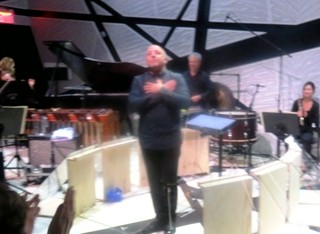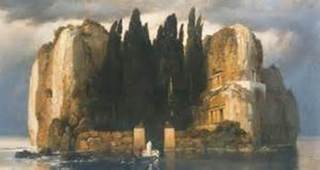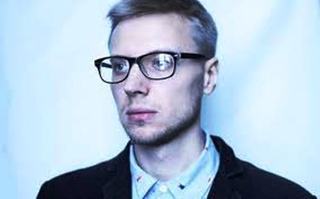|
Back
Northern Lights New York
National Sawdust
04/02/2018 -
Contact!: “Music from Young Russian Composers”
Nikolay Popov: Nibiru 20/13 (U.S. Premiere)
Marina Khorkova: VORderGRENZE (U.S. Premiere)
Denis Khorov: Barcarolle (U.S. Premiere)
Dmitri Kourliandski: Voice-off
Alexander Khubeev: Ghost of Dystopia (U.S. Premiere)
Ethan Hayden (Vocalist)
Musicians of the New York Philharmonic Orchestra: Yoobin Son (Flute), Meighan Stoops (Guest clarinet), Anna Rabinova, Marié Rossano (Violins), Peter Kenote (Viola), Wendy Sutter (Guest cellist), Sumire Kudo (Cello), Max Zeugner (Bass), Daniel Druckman (Percussion), Eric Huebner (Piano), Jeffrey Milarsky (Guest Conductor)
Andrew Quinn (Video), Esa-Pekka Salonen (Host), Gerard McBurney (Consultant)

J. Milarsky and ensemble (© Samuel A. Dog)
National Sawdust, a mere three blocks from the L Subway in Williamsburg, is galaxies away from your usual music hall. Not only is the neighborhood sparkling with restaurants, trendy retailers, quiet deluxe bars and the best pizzeria in New York city, but two blocks from National Sawdust is a park, a river, delightful scenery.
As for National Sawdust, where else can you share a drink with a world-famous conductor/composer, where else can you rub minds and share drinks with players from the New York Philharmonic?
And, thanks to host/conductor Esa-Pekka Salonen last night, where else can you hear premieres from the brightest stars of the young Russian composer elite?
Without their presence, Mr. Salonen was unable to have his enlightening one-on-one interviews, and hosting was more symbolic than revealing. Yet each of the five composers had something new to say–even if the vocabulary was either non-musical or incommunicado.
The Contact! evening started with an unnamed homage to Alexander Scriabin. Not musically, but in theme. Nibiru 20/13 celebrated a “mystical planet” (thank you, Mr. Scriabin) which enters our solar system ever 3,600 years, causing worldwide calamities.
Musically this was

A. Böcklin’s Isle of the Dead
The most plainly gorgeous (and perhaps anachronistic) work was based on one of the most famous paintings of the past century. Swiss artist Arnold Böcklin’s Isle of the Dead was the blatant inspiration for Rachmaninoff’s eponymous orchestral work. And had Liszt seen this, his La lugubre gondola would have been the result.

D. Khorov
Buryatia-born Denis Khorov was also inspired, not by the tideless river or the spectral island, but by Charon, the ferryman. Here turned into a gondolier.
“And what,” Mr. Khorov asked, “would the gondolier sing on his way to the land beyond life?” Flute, clarinet, cello and piano were not ghostly at all. Their introduction resembled tranquil Brahms with a few wrong notes. True, that so bourgeois Brahms could be infuriatingly placid to most of us. But...
Well, but ask yourself, if you were being ferried over to the Isle of the Dead, would you rather be serenaded by Webern’s cantata? Taylor Swift? A Palestrina Mass? Personally, I’d choose a few Monteverdi madrigals. But this so equable music by Mr. Khorov would fit perfectly well. When clarinetist Meighan Stoops went slowly down the scale and cellist Sumire Kudo gently played little motifs, one felt that Mr. Khorov had captured the phantasmal atmosphere completely
The single most extraordinary piece was not for public consumption. Writer/trombonist/vocal artist/author Ethan Hayden “played” Dmitri Kouliandski’s Voice-off. Here’s the deal: on separate staves are “notes” for “lips, teeth tongue, throat and vocal cords.” Apparently a woman named Natalia Pschenitschnikova gave the world premiere. Anybody who lives with that name should be able to master this. Mr. Hayden, with a simpler name clicked, whispered, clucked, made noises of a trombone (including two voices), and over 12 minutes, raised eyebrows (of audience and artist), and would make the most accomplished jew’s-harp player seem like a mute.
A remarkable performance, and far more interesting than the final piece–which Mr. Salonen was unable to quite call music.
My admiration for Jeffrey Milarsky is without end. Here, in Alexander Khubeev’s Ghost of Dystopia, he did a helluva lot of work without much to show for it. Facing the largest ensemble of the evening–clarinet, Daniel Druckman’s percussion, piano, violin, viola, cello and double-bass, Mr. Milarsky stood for a few seconds while sensors were attached to his fingers and legs. The sensor wires themselves had toys and bags attached to them. Mr. Milarsky’s movements created a “sound aura”–actually, static–which complemented the sounds of the ensemble.
Well, the piece was called Ghost of Dystopia, and composer Alexander Khubeev wanted to continue from Karl Marx’s “ghost of communism”, and Mr. Milarsky weaved and bobbed, and the double-bass (near where I was sitting) scratched and belched, and Mr. Druckman boomed and played on marimba (or whatever), and it was, I guess, both impressive to watch and dystopian to hear.
A maximum of labor, a minimum of results. Mr. Salonen politely listened, the lights went dark, then brightening, and then we all thankfully went home.
Harry Rolnick
|